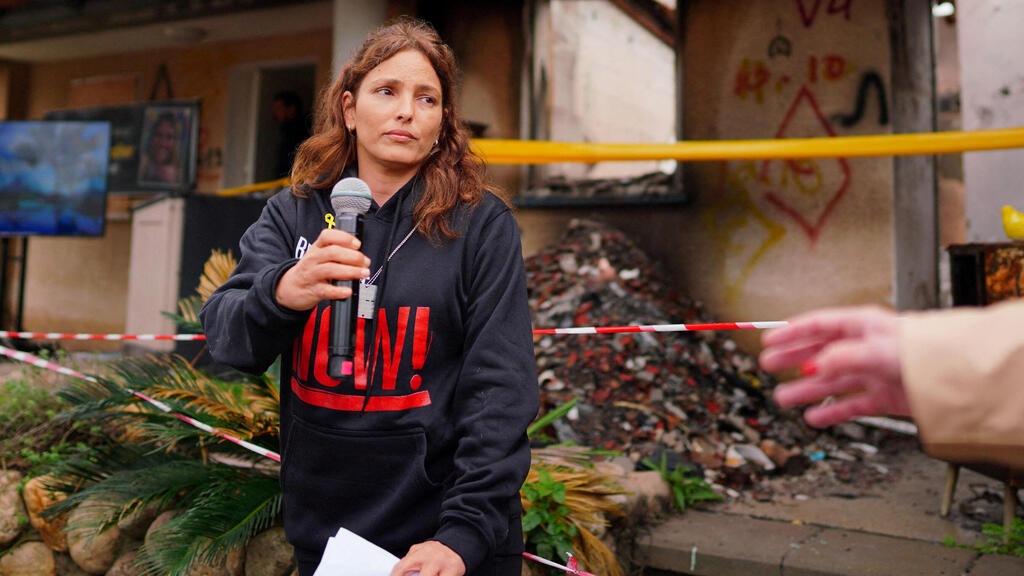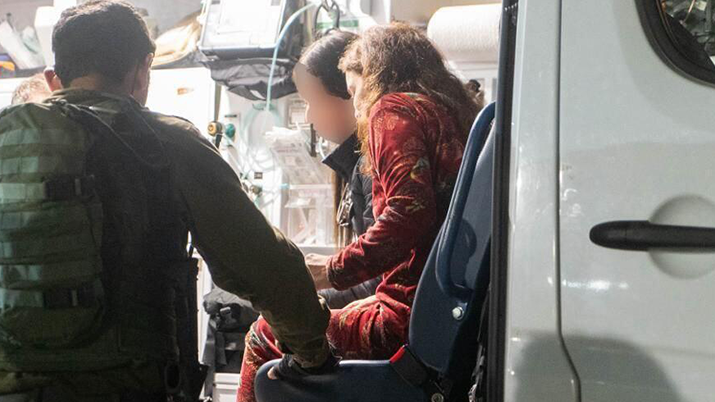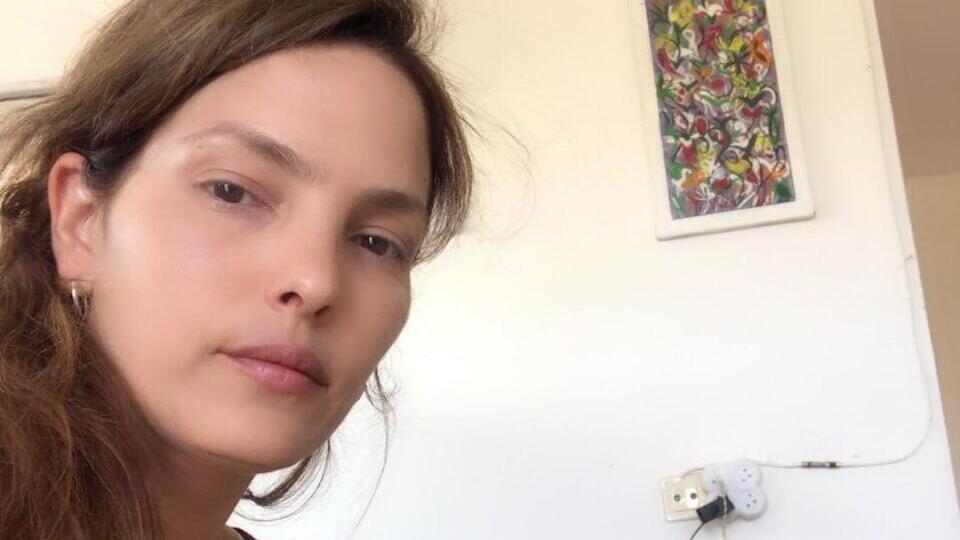Getting your Trinity Audio player ready...
The chilling testimony of Amit Soussana, who told The New York Times, that she was sexually assaulted while in captivity in the Gaza Strip, is the first public, first-hand testimony about the terrorists' sexual crimes against the hostages, both male and female. Her great courage to open up and tell about the horrors she experienced during her 55 days in Hamas captivity has provoked a host of supportive responses, and has increased the fear for the well-being of those who have not yet been released and remain in the Gaza Strip.
Among the first to comment was IDF spokesman, Rear Admiral Daniel Hagari, who in his statement Tuesday night after the article was posted on the newspaper's website said that the testimony of 40-year-old Soussana is extremely important. "This is a chilling testimony. Amit's courage, her personality, and her choice to bring the difficult testimony to the world deserves deep appreciation. Amit is a real hero." In a rather emotional voice, Hagari added that Amit's testimony is another reminder of the duty of the IDF and the security establishment to do everything to bring home the 134 that remain in Gaza.
"This is a wake up call to the world to act. To do everything and pressure Hamas. To free our hostages. To bring our hostages home. 134 hostages in horrific conditions under the captivity of Hamas. This is why we are in Gaza. This is why we fight,” he said.
"Every additional day in captivity for them is a terrible day and a terrible eternity for them. This is our moral obligation and that of the entire world, and it is not shaken nor forgotten for even a single moment. This is the compass of the soldiers who are now fighting in the Gaza Strip and this is their task," he said.
As he had done in the past, Hagari appealed to the hostages themselves, hoping that they might hear him, and reassured them and their families. "It is impossible to imagine the magnitude of the pain, suffering and uncertainty you are experiencing. We will continue to fight and create the conditions in order to bring you home and strengthen your loved ones, who are our dear ones," he said.
The families of the hostages also expressed great appreciation for the courage of Soussana, who was released as part of the first hostage-for-prisoner exchange deal with Hamas in November, and called for everything to be done to free those who were left behind. "The brave testimony of hostage survivor Amit Soussana, detailing the horrors and sexual abuse she went through in Hamas captivity, is added to the many testimonies from the survivors of the captivity who were released, regarding the subhuman conditions in which they had to survive. Like them, 134 hostages continue to be held and have been going through these horrors for 172 days already," they said in a statement issued from their headquarters.
"Soussana's testimony reinforces the findings of the United Nations regarding 'clear and convincing' evidence that the hostages suffer sexual violence. Amit is a hero, like all the hostages who suffered and continue to suffer this hell. We must bring these brave men and women home before it is too late," they added.
Dr. Ayelet Levy Shahar, the mother of 19-year-old hostage Naama Levy, expressed grave concern for the safety of her daughter; In a video from October 7 she was seen being dragged from a jeep in Gaza at gunpoint, with the seat of her sweatpants stained with blood.
"The shocking testimony of Amit Soussana is more proof that our beloved girls suffer physical, sexual and mental abuse every day in captivity," said the mother.
"Every day they are there is like an eternity," she added. "What Amit went through is the same nightmare experienced every day by so many hostages, both men and women, held in captivity. Perhaps even at this very moment. They, all of us, are in the middle of an ongoing terrorist attack that must be put to an end. We beg and demand: return our girls and all our dear ones home. Now. Before it's too late."
Orit Sulitzeanu, CEO of the Association of Rape Crises Centers in Israel, said that Soussana 's testimony "crushes the heart" and "forces the world to act."
"Choosing to say the things with her voice and face is tremendous bravery. We seek to strengthen her and stand by her side at this time, and continue to echo that sexual and gender crimes were committed in the war," according to Sulitzeanu. She also called for everything to be done to free the other hostages. "Every minute in captivity is a danger to lives. It is the duty of the Israeli government and the governments of the world to do whatever is necessary to bring them home."
Hagit Par, chair of the Israeli women's organization Na'amat, said that the difficult-to-hear testimony is important in the fight against the deniers of the massacre on October 7 and the sexual crimes committed by the terrorists. " We stand behind you, and of course believe you and strengthen you," she said, addressing the hostages.
Amit Sosna, a lawyer by profession who was kidnapped from her home in Kfar Gaza, said in her testimony published in the New York Times that she was sexually assaulted by the terrorist who guarded her, less than three weeks after October 7.
“He came toward me and shoved the gun at my forehead,” Soussana recalled during eight hours of interviews with The New York Times in mid-March. Her captor forced her to remove her towel after allowing her to wash herself for the first time in weeks, groped her, sat her on the edge of the bathtub and hit her.
5 View gallery
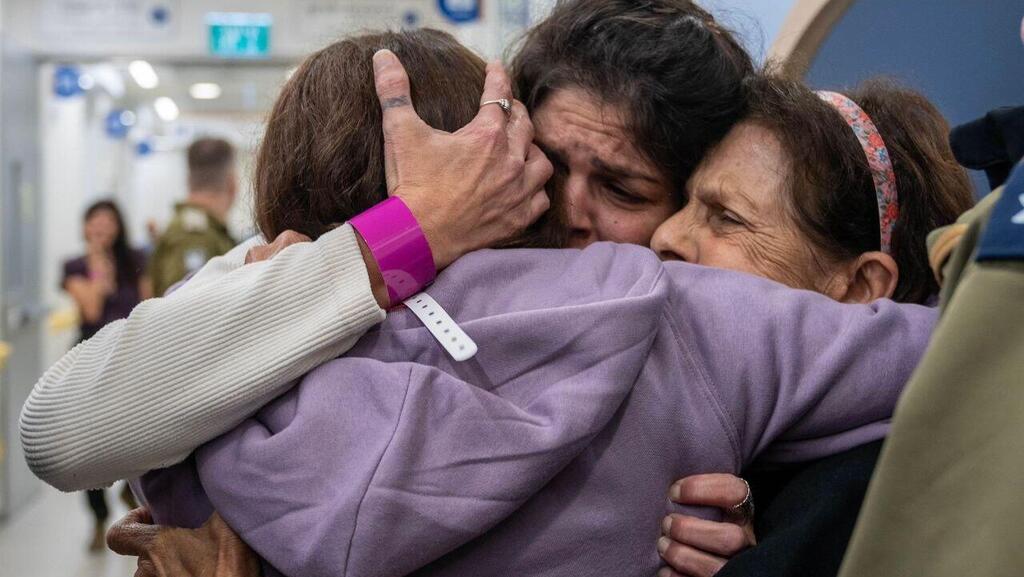

Amit Soussana reunited with her mother and sister after her release from Hamas captivity
(Photo: Wolfeson Medical Center PR )
He dragged her at gunpoint back to the child’s bedroom, which was covered in posters of the cartoon character SpongeBob SquarePants, according to Soussana.
“Then he, with the gun pointed at me, forced me to commit a sexual act on him,” Soussana said.
In her chilling testimony, Soussana says that a few days after she was abducted from her home in Kfar Aza, a terrorist who identified himself as Muhammad began asking her about her sex life. She said that she was then kept alone in a children's room, chained by her ankle to the window frame and wearing only underwear. Sometimes the terrorist who was guarding her entered the room, sat down next to her on the bed then lifted her shirt and touched her.
The terrorist repeatedly asked her when her period was expected. Soussana testified that when her period ended, around October 18, she tried to stop him from sexually assaulting her by pretending the bleeding continued for an entire week.
punching me and put his gun in my face,” Ms. Soussana said. “Then he dragged me to the bedroom.”
The severe sexual assault she described occurred around October 24.
“He sat me on the edge of the bath. And I closed my legs. And I resisted. And he kept punching me and put his gun in my face,” Ms. Soussana said. “Then he dragged me to the bedroom.”
After sexually assaulting her, he went to take a shower, leaving her naked andin the dark. When the terrorist returned, he showed signs of remorse. "He said, 'I'm bad, I'm bad. Please don't tell Israel." She said that afterward she feared at any moment she would be sexually assaulted again. "You can't look at him, but you have to. He's the one who watches over you, you're with him - and you know that at any moment it could happen again. You're completely dependent on him," she explained.
She is the first released hostage to speak publicly about the sexual violence she experienced, and previously testified about the "physical and psychological terror" she experienced in captivity.
Soussana’s personal account of her experience in captivity is consistent with what she told two doctors and a social worker less than 24 hours after she was freed on November 30. Their reports about her account state the nature of the sexual act; The newspaper agreed not to disclose the specifics.
Her testimony comes against the backdrop of the great concern that the hostages who are still being held captive are in danger of sexual violence, alongside the horrific acts of rape committed by the terrorists on October 7.
5 View gallery
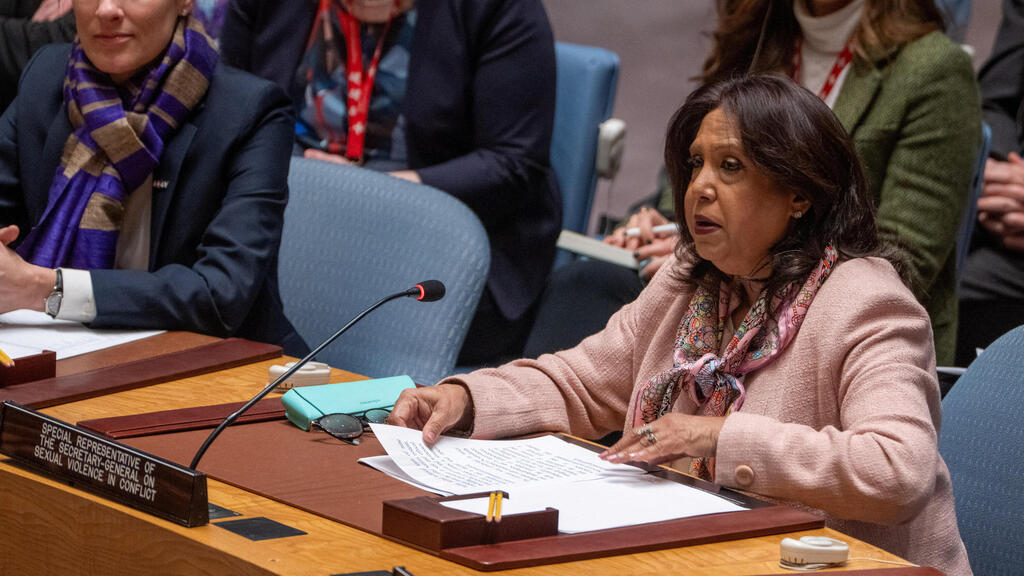

UN special envoy Pramila Patten presents her report on Hamas sex crimes to the Security Council
(Photo: David 'Dee' Delgado / Reuters)
The report of UN envoy Pramila Patten, which stated that there is evidence that extremely serious acts of rape were committed during the October 7 massacre, also confirmed that the male and female hostages were subjected to sexual violence - and warned that this may still continue.
Soussana said she had decided to speak out now to raise awareness about the plight of the 134 hostages still held in Gaza, as negotiations for a cease-fire seem to have fallen apart.


